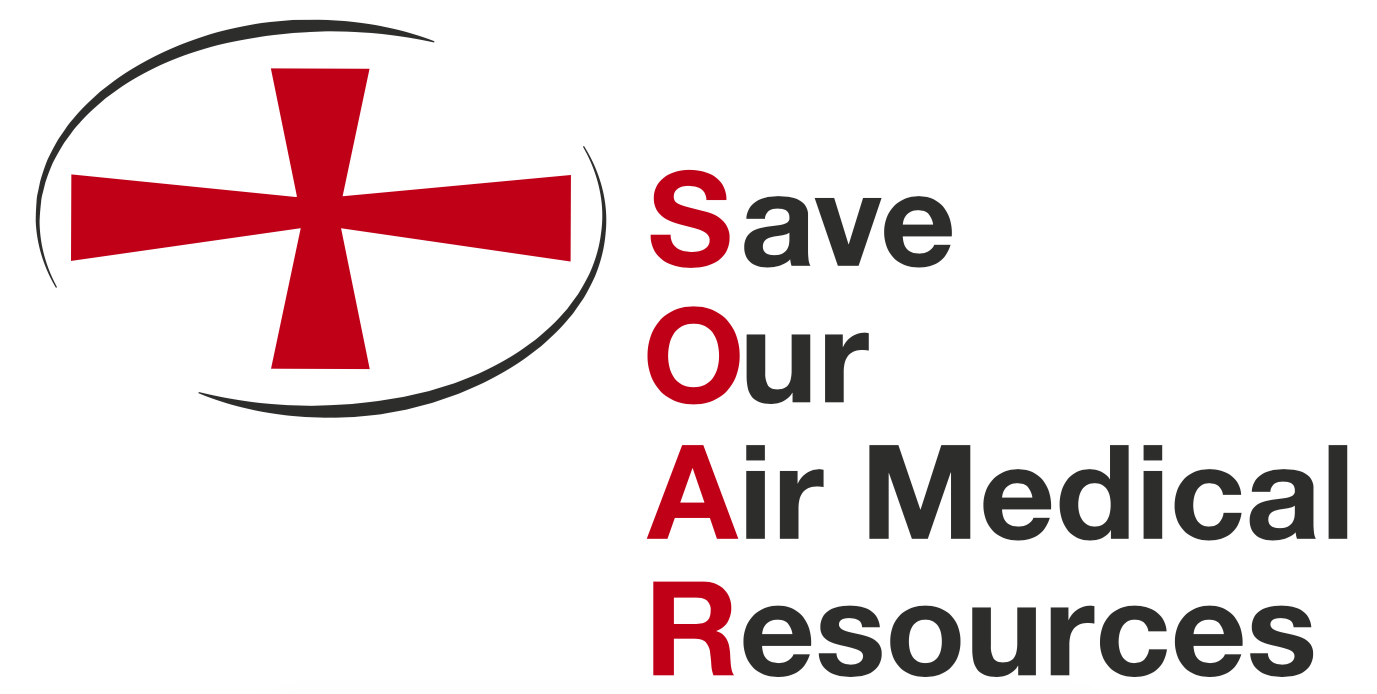FOR IMMEDIATE RELEASE
December 8, 2020
Contact: media@soarcampaign.com
Washington, DC – Save Our Air Medical Resources (SOAR), a national campaign dedicated to preserving access to emergency air medical services for Americans across the country, together with six patient and consumer advocacy organizations, sent a letter to Congressional leaders today urging them to take up a COVID-19 relief package that supports health care providers who are on the frontlines in the fight against the virus.
In the letter, SOAR notes that providers, including air medical services, are facing immense challenges like financial strain, lack of PPE, and capacity issues, and that any relief package must include resources to support them while avoiding the inclusion of misguided policies that could do harm. To date, the air medical industry has transported more than 10,000 COVID-19 patients, providing life-saving care and swift transfer to the nearest appropriate facility for critical patients. It is important that the air medical industry and other providers have the resources and support they need to continue saving lives during the worsening pandemic.
Below is the full text of SOAR’s letter to Congressional leaders.
Dear Leaders:
We are a group of health care, consumer, and public safety organizations writing to thank you for your continued efforts to craft much-needed COVID-19 relief legislation for the American people. As cases of COVID-19 continue to rise at alarming rates across the U.S., frontline responders and health care workers are rising to meet the challenge, including the brave pilots and medical professionals who staff emergency air medical transports.
Air ambulances, equipped with ventilators and highly trained medical staff, provide swift transport to the nearest hospital for patients in critical condition when every second counts. More and more often, this includes COVID-19 patients suffering respiratory distress or in need of inter-facility transport while remaining intubated. As the virus ravages minority populations, Black, Asian, and Hispanic patients are at an increased risk of ICU admission and death. The sickest among these has a greater chance of survival with air medical transport to a facility that can provide a higher level of care. Early estimates indicate that the air medical industry has transported over 10,000 COVID-19 patients since the beginning of the pandemic, a number that will drastically increase as we head into the winter months.
Congress must take up a relief package that supports health care providers as soon as possible. We are now in in the ninth month of the pandemic and the situation is urgent - providers of all types are facing increased challenges including financial strain, lack of PPE, capacity issues, and the like. Any package considered must support all providers, including the air medical industry, while avoiding the inclusion of misguided policies that could potentially do them harm.
Air medical services are especially important in rural America where hospital closures have reduced access to emergency medical care for millions of Americans. As the coronavirus intensifies in rural states, air ambulances fill the gap left by these closures, transporting patients from overrun and under-equipped rural facilities to hospitals with the capacity to treat them.
In normal times, emergency air medical services provide critical support for those who have suffered a major cardiac event, stroke, or trauma such as brain injury - these patients account for 90 percent of those transported. These individuals will continue to need access to immediate emergency care even after the pandemic is over, and we must ensure the industry is there to help them.
We ask that the next COVID-19 relief package include additional resources for air medical services to account for the rising costs the industry has faced during this pandemic – including investment in PPE and increased aircraft sanitation procedures. This aid will help ensure air ambulance bases can maintain 24-7 readiness to deploy at all times to save lives. These providers, like all other health workers, also need additional PPE to help protect pilots, medical staff, and patients during each flight.
Finally, as you look to the important work of the new Congress, we urge you to prioritize updating the Medicare and Medicaid air ambulance fee schedule (AFS). The current AFS is decades old and, as such, has not kept pace with the increased cost of providing air medical services due to the adoption of new technologies in medical equipment and aviation safety. While Medicaid, Medicare, and uninsured patients account for nearly 70 percent of air medical transports, Medicare and Medicaid reimburse only about half the cost of the actual transport. This destabilizes the market and causes cost-shifting to keep the industry afloat in order to provide life-saving care. The Centers for Medicare & Medicaid Services should collect cost reporting data from air ambulance companies to increase transparency in the industry and to update the AFS in a way that more accurately reflects cost.
As the nation wrestles with COVID-19, it is more critical than ever that patients have access to emergency, life-saving air medical services, and we appreciate Congressional efforts to support this vital industry. Thank you for your leadership and attention to this important issue.
Sincerely,
Air Ambulance Worldwide
American Medical Women’s Association (AMWA)
Association of Air Medical Services (AAMS)
Brain Injury Association of America (BIAA)
Consumer Action
International Association of Flight Paramedics (IAFCCP)
Save Our Air Medical Resources (SOAR)

